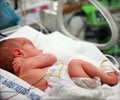After struggling for years to explain why some apparently healthy babies die suddenly in their sleep, a study published Tuesday finds serotonin deficiency as a key culprit in sudden infant death syndrome (SIDS) or cot death.
Researchers at Children's Hospital Boston found that infants who died of cot death, which is the leading cause of death in babies under the age of one in the United States, had significantly lower levels of the neurotransmitter serotonin and the enzyme that helps make it in their brainstems.SIDS babies also had fewer serotonin receptors in the brainstem, another indication that there was a problem with the babies' systems, according to the study, which was published in the Journal of the American Medical Association (JAMA).
Brainstem serotonin controls involuntary functions such as heart rate, blood pressure, body temperature and breathing.
The researchers who conducted the study believe that SIDS claims babies' lives because the serotonin-deficient brainstem, which works with no back-up during sleep, fails to spring into action to alert the infant when it is faced with a life-threatening challenge while asleep.
"When the baby is awake, the brainstem works together with other systems -- in the forebrain, the cortex -- to control functions like heart rate and breathing," David Paterson, one of the lead authors of the study, told AFP.
"However, when the baby is asleep, the higher functions in the brain switch off, so the brainstem system itself is solely responsible for controlling all these functions," he said.
Advertisement
"If the serotonin brainstem system is not working properly, the baby might not respond to this challenge and die," Paterson said.
Advertisement
Earlier studies which found that the risk of cot death increased when a baby is laid on its stomach to sleep had sparked campaigns around the world to get parents to lay their little ones in their cribs for the night on their backs or sides.
The campaigns initially met with success, but then the overall SIDS rate leveled off and has stayed steady for years.
Following this latest study, the researchers say the next step would be to devise a test to identify infants with a serotonin brainstem defect and develop treatments to correct serotonin deficiency.
But they stressed that while the study provides strong evidence for a biological cause of SIDS, it also shows that other factors, such as stomach-sleeping, can aggravate the risk of cot death.
Of the 35 SIDS infants in the study, 95 percent died with at least one risk factor and 88 percent died with at least two.
Until scientists have come up with a test and remedy for serotonin brainstem deficiency, parents can do their part to reduce the danger of their baby dying suddenly in its sleep by removing SIDS risk factors from the infants' environment, said neuropathologist Hannah Kinney, who led the study.
"During pregnancy, there is no safe level of alcohol a mother can drink and no safe level of smoking, either firsthand and secondhand.
"Until 12 months of age, babies should sleep on their backs in a crib with a firm mattress, and without toys, soft pillows, excessive blanketing or excessive clothing," she said.
Source-AFP
THK











